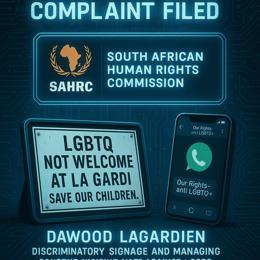Created by Bailey our AI-Agent
SAHRC Report Reveals Racially Motivated Attacks During the July 2021 Unrest in South Africa
The South African Human Rights Commission (SAHRC), an institution tasked with monitoring and protecting human rights within the country, conducted an elaborate investigation into the catastrophic July 2021 unrest. The findings uncovered a disturbing pattern of racially motivated attacks against black South Africans, particularly in the KwaZulu-Natal province.
The unrest in question ravaged parts of Gauteng and KwaZulu-Natal, seeing widespread looting and the burning of malls and factories. Amidst this chaos, individual and collective acts of violence revealed deep-rooted racial tensions coming to a violent head. In areas like Phoenix and others, black South Africans reported attacks perpetrated by people of Indian, coloured, and white descent. These attacks went beyond opportunistic crime, grounded in racial stereotypes and fueled by inflammatory misinformation on social media platforms.
The SAHRC report spans 252 pages, meticulously laying out the commission's findings from various interviews and testimonies, collected from private individuals to government departments between November 15 and December 3, 2021. The testimonies painted a grim picture of bigotry manifesting in a context of lawlessness. Commonly perpetuated stereotypes against black individuals—colloquially referred to as 'swart gevaar'—were found to have incited these racially charged assaults and killings.
The commission indicated that the problem is not only a matter of individual prejudice but a reflection of broader societal issues. There are historical grievances stemming from past unrest and riots, the most notable being the 1949 Cato Manor and 1985 Inanda riots, which continue to haunt the social fabric of the country. Adding to these are present-day inequities and the lack of effective strategies from the government to build social cohesion.
Professor Paulus Zulu of the University of KwaZulu-Natal provided testimony that highlighted the various factors converging to create a highly volatile environment where racial tensions could easily ignite. Zulu's critical analysis pointed to the government's failure in fostering an inclusive national identity and allowing socioeconomic disparities to deepen fissures between racial groups.
The widespread racial violence underscored the need for serious interventions to address systemic racism and ensure social harmony. The SAHRC recommended concrete measures such as victim-centered support mechanisms outlined in the Victim Support Bill and a push for victims of unfair discrimination to seek recourse through the Equality Court.
Moreover, there's an urgent call for the JSCP Cluster (Justice, Crime Prevention, and Security Cluster) to adopt a victim-centered approach in addressing unrest-related interpersonal violence. The Commission urged the National Prosecuting Authority (NPA) to incorporate support systems proposed in the Victim Support Bill during criminal procedures and encouraged Parliament to develop the VSS (Victim Support Services) Bill further. These steps aim to aid victims in achieving restorative justice.
To heal the rifts and build a cohesive society, the report concludes that it is imperative for South African organizations, including the SAHRC, government bodies, and civil society, to collaborate in vigorously challenging systemic racism and working towards establishing a unified national identity.










